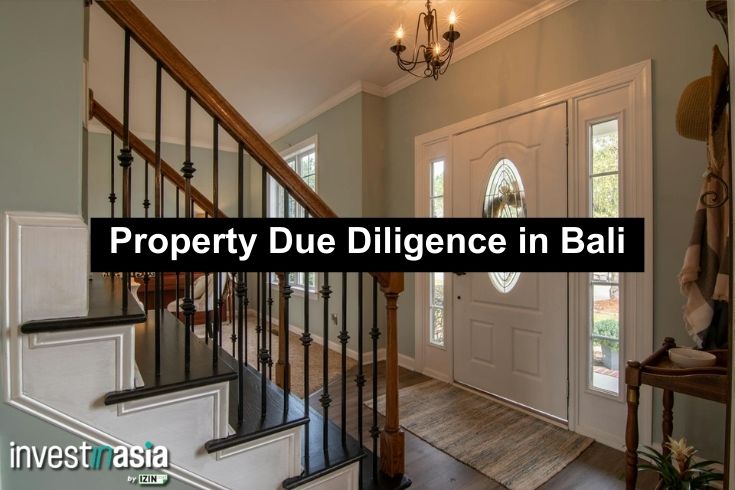Real estate investment in Bali is a dream for many, with its picturesque landscapes and promising returns. However, navigating the complexities of the Indonesian real estate market requires thorough due diligence to mitigate risks and ensure a smooth transaction process. In this comprehensive guide, we delve into the intricacies of real estate due diligence in Bali, outlining essential steps and considerations for prospective buyers.
Also read: Bali Property Market: 2024 Trends and Outlook
What is Property Due Diligence in Bali?


Before diving into the intricacies of real estate due diligence, it’s crucial to grasp its significance in the context of Bali’s property market. Property due diligence encompasses the meticulous examination of various facets of a real estate transaction to validate information, identify potential risks, and safeguard investments. In Bali, where legal frameworks and cultural nuances differ from those in Western countries, conducting thorough due diligence is imperative to navigate complexities effectively.
Why Real Estate Due Diligence in Bali is Important?
The allure of Bali’s real estate market is undeniable, but so are the associated risks. From intricate legal procedures to cultural considerations, several factors underscore the importance of due diligence:
Legal Complexity
Bali’s legal landscape is multifaceted, often presenting challenges for foreign investors. Real estate due diligence ensures compliance with Indonesian laws and regulations, averting legal entanglements that could jeopardize investments.
Zoning and Land Use
Navigating Bali’s zoning laws and land use regulations is paramount to ascertain the feasibility of intended developments. Due diligence aids in assessing zoning restrictions and land usage parameters, aligning investment strategies with regulatory frameworks.
Environmental and Cultural Preservation
Bali’s rich cultural heritage and fragile ecosystem necessitate diligent environmental and cultural assessments. By conducting due diligence, investors can mitigate environmental risks and demonstrate respect for local customs, fostering sustainable development practices.
Also read: Freehold vs Leasehold Property in Bali: What’s The Differences?
Key Steps for Property Due Diligence in Bali


Embarking on a real estate venture in Bali demands meticulous planning and execution. Here’s a comprehensive roadmap comprising five essential steps for effective property due diligence:
Site Visit and Inspection
Initiate the due diligence process by conducting a thorough site visit to evaluate the property’s physical attributes and suitability for investment. Engage qualified inspectors to assess structural integrity and validate property dimensions against official records.
Verification of Land Ownership and Seller’s Authority
Verify the authenticity of land titles and confirm the seller’s legal authority to transact the property. Scrutinize government records to ascertain ownership legitimacy and validate the seller’s authorization through notarized documentation.
Validation of Licenses and Permits
Ensure compliance with regulatory requirements by validating all pertinent licenses and permits. Verify approvals from local authorities, such as Building Approval (PGB), to mitigate risks associated with unauthorized developments.
Document Verification
Thoroughly examine documentation beyond land titles, including tax records and environmental clearances. Seek legal counsel to assess the completeness and authenticity of documents, mitigating potential liabilities and legal disputes.
Also read: Bali Property Tax: 2024 Complete Guide
Contract Review and Negotiation
Prior to finalizing the transaction, meticulously review the purchase contract in collaboration with legal advisors. Clarify terms and conditions, negotiate favorable terms, and safeguard interests through comprehensive contract scrutiny.
Also read: Land Zoning in Bali: Guide for Property Investment
Notes for Foreigners
Foreigners in Indonesia are unable to directly own land. Instead, they must utilize a foreign-owned company, PT PMA, registered with the Indonesian Investment Coordinating Board (BKPM).
Through PT PMA, they can acquire property under two titles: Right to Build (Hak Guna Bangunan/HGB) grants the right to construct buildings on leased land for up to 80 years, while Right to Use (Hak Pakai) allows the utilization of existing properties on land with a tenure of 25 years, renewable for up to 70 years. (check: PT PMA vs Non-PT PMA: Buying Property in Bali Compared)
Establishing a PT PMA in Bali entails numerous requirements and processes. To simplify the PMA registration and accelerate the property acquisition process in Bali, you can rely on InvestinAsia’s service. We offer PMA Incorporation for Foreign Property Acquisition.
Our team of professionals will guide you through the entire process, ensuring that no requirement is overlooked and that the registration proceeds seamlessly.
Reach out to our team now for a FREE consultation and take advantage of our exclusive offer!
In conclusion, real estate due diligence in Bali serves as a linchpin for informed decision-making and risk mitigation in property investments. By adhering to a systematic due diligence framework encompassing site inspections, document verification, and legal scrutiny, investors can navigate Bali’s real estate landscape with confidence and prudence.
Also read: Can Foreigners Buy Property in Bali? (2024 Complete Guide)
FAQs about Property Due Diligence
What is the significance of due diligence in Bali’s real estate market?
Due diligence in Bali’s real estate market is essential to validate information, mitigate risks, and ensure legal compliance, safeguarding investments against potential pitfalls.
How does due diligence address environmental concerns in Bali?
Due diligence entails assessing environmental risks and ensuring compliance with regulations to mitigate adverse impacts on the environment and preserve Bali’s natural heritage.
Why is legal verification crucial in property due diligence?
Legal verification ensures the legitimacy of property ownership, confirms the seller’s authority to transact, and mitigates the risk of legal disputes, enhancing transaction security.
What role does cultural sensitivity play in real estate due diligence?
Cultural sensitivity is integral to due diligence in Bali, facilitating respect for local customs and traditions while adhering to ethical business practices, fostering harmonious community relations.
How can investors streamline the due diligence process in Bali?
Investors can streamline the due diligence process by engaging qualified professionals, leveraging local expertise, and adhering to a structured due diligence framework tailored to Bali’s unique regulatory landscape.
Also read: Mistakes When Buying Property in Bali: 9 Things to Avoid
Bali Property and Real Estate Due Diligence Checklist
- Initial Property Assessment: Evaluate location, accessibility, market demand, and appreciation potential.
- Legal Ownership Verification: Confirm the seller’s legitimacy through official documents.
- Review Property Title: Scrutinize accuracy and completeness to match seller claims.
- Check Land Records: Confirm property boundaries, size, and ownership history.
- Verify Property Ownership: Cross-reference with official records and transactions.
- Check Land Use and Permits: Ensure compliance with local zoning laws.
- Investigate Legal Issues: Assess outstanding debts, liens, or encumbrances.
- Search for Legal Disputes: Identify past or ongoing legal issues.
- Review Legal History: Examine past legal challenges or disputes.
- Verify Environmental Compliance: Ensure adherence to regulations, especially in sensitive areas.
- Assess Tax Obligations: Evaluate tax history and liabilities.
- Examine Contracts and Agreements: Review leases or joint ventures.
- Compliance with Building Codes: Confirm adherence to regulations.
- Market and Regulatory Analysis: Analyze market value and trends.
- Compile Due Diligence Report: Document findings comprehensively.
- Document Findings: Maintain detailed records.
- Provide Recommendations: Offer clear guidance based on findings.
- Negotiation and Issue Resolution: Resolve concerns collaboratively with the seller.
- Negotiate with Seller: Finalize purchase agreement terms.
- Address Legal Concerns: Resolve discrepancies and secure approvals.
- Final Property Check: Ensure compliance with agreed standards.
- Confirm Issue Resolution: Ensure all identified issues are resolved.
- Ensure Legal Compliance: Verify compliance with regulations. Following these steps ensures a secure property investment in Indonesia.




